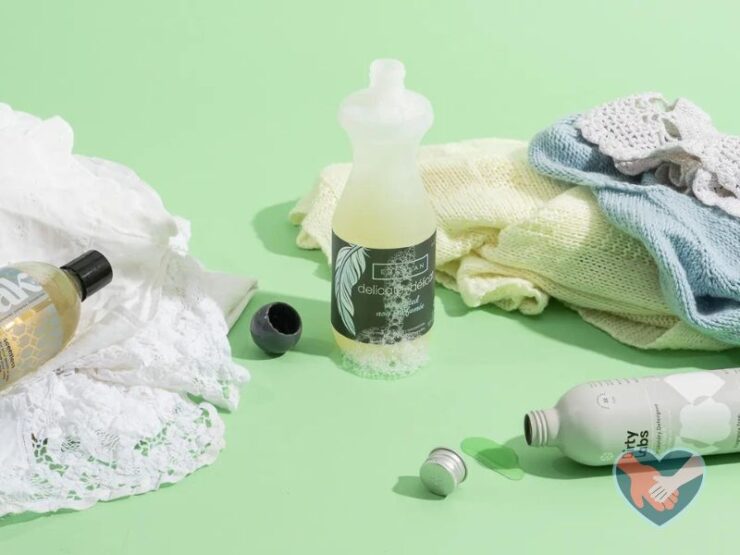When it comes to caring for delicate fabrics, choosing the right laundry detergent is crucial to maintain the integrity of the material. Delicate fabrics such as silk, wool, lace, and fine synthetics require extra attention to avoid damage like fading, shrinking, or wear and tear. Not all detergents are created equal, and using the wrong one can cause irreversible harm to your clothing. In this guide, we will explore which type of laundry detergent is best for delicate fabrics, the features that make them suitable, and tips for properly caring for these sensitive materials.
Understanding Delicate Fabrics
Before discussing the detergents, it’s important to understand what constitutes a delicate fabric. Fabrics like silk, wool, lace, chiffon, and lingerie materials fall into this category. These fabrics are typically lighter, softer, and more sensitive than regular fabrics like cotton or polyester. Their fibers can be easily damaged by aggressive washing techniques or harsh chemicals. Therefore, they require special handling during the washing process, and that includes the use of a gentle detergent.
Key Considerations When Choosing Laundry Detergent for Delicate Fabrics
There are several factors to consider when choosing the best laundry detergent for delicate fabrics:
- Gentleness: Delicate fabrics require a detergent that’s mild and free from harsh chemicals like chlorine, phosphates, and optical brighteners, which can strip away the natural softness and shine of the fabric.
- pH Balance: Look for detergents that are pH-neutral. A neutral pH helps maintain the fabric’s texture and color, preventing fading or damage caused by overly acidic or alkaline solutions.
- Free from Enzymes: Some detergents contain enzymes that break down protein-based stains (like blood or sweat). While effective for regular laundry, these enzymes can degrade proteins found in fabrics like silk and wool.
- Low-Suds Formulation: Delicate fabrics do not benefit from high-sudsing detergents, which can leave residue and require excessive rinsing. Low-suds formulas are preferable because they rinse away cleanly, reducing the risk of detergent buildup.
- Hypoallergenic: People with sensitive skin often wear delicate fabrics like silk. Detergents that are hypoallergenic, fragrance-free, and dye-free help minimize skin irritation.
- Eco-Friendly Ingredients: Natural detergents made with plant-based ingredients are often a good choice for delicate fabrics. They tend to be gentler and free from synthetic chemicals that could harm sensitive fabrics.
Types of Laundry Detergents Suitable for Delicate Fabrics
Now that we understand the factors to consider, let’s dive into the types of detergents that work best for delicate fabrics:
1. Liquid Detergent
Liquid detergent is typically the best option for delicate fabrics. Here’s why:
- Gentle Formula: Liquid detergents dissolve easily in water, making them gentler on fabrics. They don’t leave behind residue that powder detergents might.
- Easily Dilutable: Liquid detergent can be diluted with water for a milder wash, reducing the impact of any cleaning agents on delicate fibers.
- Works Well in Cold Water: Since delicate fabrics are often washed in cold water to preserve their integrity, liquid detergents are particularly effective because they dissolve well even at low temperatures.
- Avoid Residue: Delicate fabrics like silk can easily absorb residue, causing discoloration or damage. Liquid detergent is less likely to leave residue behind, ensuring a cleaner and safer wash.
2. Detergent Pods
Laundry pods are another option for washing delicate fabrics, although they need to be used with caution.
- Pre-Measured Amount: Pods contain a pre-measured amount of detergent, which can prevent overuse of detergent—a common issue that can damage delicate fabrics.
- Convenience: Pods are easy to use, especially in situations where a quick and convenient solution is needed for delicate handwashing or machine washing.
However, not all pods are gentle, and some contain harsh chemicals. It’s crucial to choose pods specifically labeled as safe for delicate fabrics. Also, pods should be fully dissolved before coming in contact with your clothes, as concentrated detergent can harm the fabric.
3. Specialty Detergents for Delicates
There are detergents specifically formulated for delicate fabrics, and these tend to be the safest option.
- Designed for Sensitive Fibers: Specialty detergents are free from harsh chemicals and enzymes that could damage silk, wool, and lace. They are often pH-neutral and designed to preserve the fabric’s softness and shape.
- Hand Wash and Machine Wash Compatibility: These detergents are often versatile enough to be used in both handwashing and machine washing cycles. Delicate fabrics frequently require hand washing to maintain their integrity, and these detergents are ideal for that purpose.
- Brands to Consider: While we won’t reference any specific products, many popular brands offer detergents made specifically for delicate fabrics. Check the label to ensure the detergent is free from any chemicals that could harm your clothes.
4. Baby Detergent
Interestingly, baby detergents can also work well for delicate fabrics.
- Mild Formulation: Designed for babies’ sensitive skin, these detergents are free from dyes, fragrances, and harsh chemicals. Their gentleness makes them suitable for delicate materials.
- Hypoallergenic: Baby detergents are hypoallergenic, which reduces the risk of irritation to both your skin and the fabric.
- Low-Sudsing: These detergents often have low-suds formulations, which is ideal for delicate materials that require minimal residue.
5. Wool and Silk Detergents
Some detergents are designed specifically for silk and wool. These materials have different needs than other fabrics, and standard detergent could cause damage. Wool and silk detergents are formulated to maintain the natural oils in the fibers, preventing them from becoming brittle and damaged.
- Moisture Retention: These detergents help wool and silk maintain their moisture, which is essential for keeping the fibers smooth and preventing them from becoming dry and frayed.
- Protein-Safe: Wool and silk are protein-based fabrics, and detergents made for these materials avoid using enzymes that could break down the fabric.
Best Practices for Washing Delicate Fabrics
Using the right detergent is only half the battle when caring for delicate fabrics. Here are some additional tips to ensure your delicate garments stay in good condition:
- Hand Wash When Possible: Delicate fabrics like silk and lace benefit from being hand washed. Use a basin filled with cool water and a small amount of the right detergent. Gently swish the garment in the water to loosen dirt and oils, but avoid scrubbing.
- Use a Gentle Cycle: If you must machine wash delicate fabrics, use the gentle or delicate cycle on your washing machine. This cycle uses slower speeds and less agitation to protect the fibers from damage.
- Cold Water Washing: Always use cold water when washing delicate fabrics. Hot water can cause shrinkage, color fading, and weakening of the fibers.
- Avoid Wringing or Twisting: Delicate fabrics are easily misshaped, so avoid wringing or twisting the fabric to remove excess water. Instead, gently press the water out by laying the garment flat and pressing down with a towel.
- Air Dry: Delicate fabrics should always be air-dried. Using a dryer can shrink or warp delicate fibers. Lay the garments flat on a clean towel to dry, away from direct sunlight.
- Avoid Bleach: Even non-chlorine bleach can be too harsh for delicate fabrics. Always avoid bleach, as it can weaken the fibers and cause yellowing or fading.
- Use a Mesh Bag for Machine Washing: If machine washing is necessary, place delicate garments in a mesh laundry bag to protect them from the mechanical action of the washing machine.
Conclusion
When it comes to caring for delicate fabrics, choosing the right laundry detergent is essential. Liquid detergents, specialty detergents for delicate fabrics, and even mild baby detergents are great options. The key is to use a gentle, pH-neutral, enzyme-free detergent that won’t strip away the natural properties of the fabric. Combining the right detergent with proper washing techniques, such as hand washing, cold water, and air drying, will help maintain the beauty and longevity of your delicate garments.

















Add comment